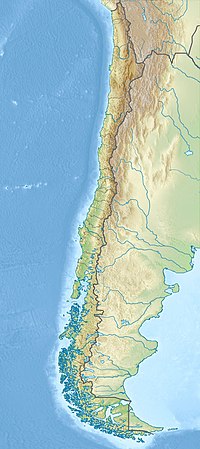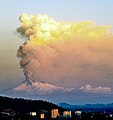Llaima: Difference between revisions
Tisquesusa (talk | contribs) →External links: +cat |
Rescuing 0 sources and tagging 1 as dead. #IABot (v1.6.1) |
||
| Line 37: | Line 37: | ||
The last major eruption occurred in 1994.<ref>{{cite web|title=Chile volcano forces evacuations|url=http://news.bbc.co.uk/2/hi/americas/7167639.stm|work=BBC|date=January 2, 2008}}</ref> |
The last major eruption occurred in 1994.<ref>{{cite web|title=Chile volcano forces evacuations|url=http://news.bbc.co.uk/2/hi/americas/7167639.stm|work=BBC|date=January 2, 2008}}</ref> |
||
An eruption on January 1, 2008 forced the evacuation of hundreds of people from nearby villages. A column of smoke approximately 3000 m high was observed. An amateur caught the early eruption phase on video.<ref>{{youtube|ju81EJ3_M3I|Volcan LLAIMA}}</ref> The [[volcanic ash]] expelled by Llaima travelled east over the Andes into [[Argentina]]. Ash fall was recorded in the area of [[Zapala]], [[Neuquén Province]], and forced the cancellation of flights to and from [[Presidente Perón Airport]] near the [[Neuquén, Argentina|city of Neuquén]].<ref>{{cite news| url=http://www.clarin.com/diario/2008/01/02/um/m-01575736.htm |title=Cancelan vuelos en el aeropuerto de Neuquén por la erupción en Chile del volcán Llaima |publisher=Clarín |date=January 2, 2008}}</ref> On July 2, 2008, another eruption resulted in evacuation of 40 people from a 15 km exclusion zone.<ref>{{cite news |
An eruption on January 1, 2008 forced the evacuation of hundreds of people from nearby villages. A column of smoke approximately 3000 m high was observed. An amateur caught the early eruption phase on video.<ref>{{youtube|ju81EJ3_M3I|Volcan LLAIMA}}</ref> The [[volcanic ash]] expelled by Llaima travelled east over the Andes into [[Argentina]]. Ash fall was recorded in the area of [[Zapala]], [[Neuquén Province]], and forced the cancellation of flights to and from [[Presidente Perón Airport]] near the [[Neuquén, Argentina|city of Neuquén]].<ref>{{cite news| url=http://www.clarin.com/diario/2008/01/02/um/m-01575736.htm |title=Cancelan vuelos en el aeropuerto de Neuquén por la erupción en Chile del volcán Llaima |publisher=Clarín |date=January 2, 2008}}</ref> On July 2, 2008, another eruption resulted in evacuation of 40 people from a 15 km exclusion zone.<ref>{{cite news |url=http://uk.news.yahoo.com/rtrs/20080702/tsc-uk-chile-volcano-011ccfa.html |title=Chile ski station evacuated as volcano erupts |publisher=Yahoo!News |date=July 2, 2008 }}{{dead link|date=January 2018 |bot=InternetArchiveBot |fix-attempted=yes }}</ref> |
||
An eruption occurred on April 5, 2009, with pyroclastic flows, ash and lava seen on the slopes.{{fact|date=December 2016}} |
An eruption occurred on April 5, 2009, with pyroclastic flows, ash and lava seen on the slopes.{{fact|date=December 2016}} |
||
Revision as of 15:21, 4 January 2018
| Llaima | |
|---|---|
 The snowy cone of Llaima volcano | |
| Highest point | |
| Elevation | 3,125 m (10,253 ft)[1] |
| Prominence | 1,819 m (5,968 ft)[1] |
| Listing | Region high point Ultra |
| Coordinates | 38°41′45″S 71°43′54″W / 38.69583°S 71.73167°W[1] |
| Geography | |
| Location | Melipeuco and Vilcún, Cautín Province, La Araucanía Region, Chile |
| Parent range | Andes |
| Geology | |
| Mountain type | Stratovolcano |
| Last eruption | 2008 to 2009 |
The Llaima Volcano is one of the largest and most active volcanoes in Chile. It is situated 82 km northeast of Temuco and 663 km southeast of Santiago, within the borders of Conguillío National Park.
Geography
The top of Llaima consists of two summits; the lower of the two, Pichillaima, is about 2,920 m (9,580 ft) high and is significantly less prominent than the higher northern summit.[2]
The average elevation of the terrain around Llaima is about 740 m asl.[2]
The volcano, along with Sierra Nevada, surrounds the Conguillío Lake. Its slopes are drained by the rivers Captrén, Quepe and Trufultruful.[2] The former ones are tributaries of Cautín River and the latter is affluent of Allipén River.
Eruptions
Llaima is one of Chile's most active volcanoes and has frequent but moderate eruptions. Llaima’s activity has been documented since the 17th century, and consists of several separate episodes of moderate explosive eruptions with occasional lava flows. The last major eruption occurred in 1994.[3]
An eruption on January 1, 2008 forced the evacuation of hundreds of people from nearby villages. A column of smoke approximately 3000 m high was observed. An amateur caught the early eruption phase on video.[4] The volcanic ash expelled by Llaima travelled east over the Andes into Argentina. Ash fall was recorded in the area of Zapala, Neuquén Province, and forced the cancellation of flights to and from Presidente Perón Airport near the city of Neuquén.[5] On July 2, 2008, another eruption resulted in evacuation of 40 people from a 15 km exclusion zone.[6]
An eruption occurred on April 5, 2009, with pyroclastic flows, ash and lava seen on the slopes.[citation needed]
For the 2010–30 period an eruption of Volcanic Explosivity Index 2 or more is expected based on statistics.[7]
Recreation
The ski center Las Araucarias lies on the volcano's western slopes.
Gallery
-
January 2008 Llaima eruption
-
January 2008 Llaima eruption
-
The April 2009 eruption seen from space
-
Summit of Llaima volcano
-
Llaima volcano a few days after the January 2008 eruption
-
Llaima volcano with a blanket of snow covering its solidified lava flows
-
Llaima volcano
-
Snow-capped Llaima in springtime seen from space
See also
References
- ^ a b c "Argentina and Chile, Central Ultra Prominences". Peaklist.org. Retrieved 2013-07-16.
- ^ a b c Template:Es icon Sernageomin. "Volcán Llaima". Archived from the original on 2007-04-29. Retrieved 2007-08-30.
{{cite web}}: Unknown parameter|deadurl=ignored (|url-status=suggested) (help) - ^ "Chile volcano forces evacuations". BBC. January 2, 2008.
- ^ Volcan LLAIMA on YouTube
- ^ "Cancelan vuelos en el aeropuerto de Neuquén por la erupción en Chile del volcán Llaima". Clarín. January 2, 2008.
- ^ "Chile ski station evacuated as volcano erupts". Yahoo!News. July 2, 2008.[permanent dead link]
- ^ Dzierma, Yvonne; Wehrmann, Heidi (2010). "Eruption time series statistically examined: Probabilities of future eruptions at Villarrica and Llaima Volcanoes, Southern Volcanic Zone, Chile". Journal of Volcanology and Geothermal Research. 193: 82–92.









